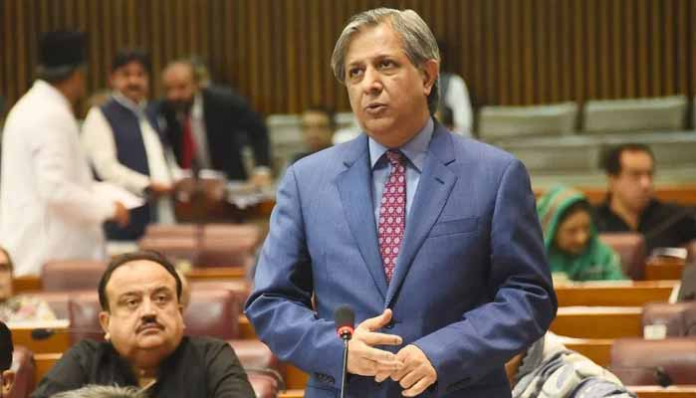Move comes after PM Shehbaz virtually chaired federal cabinet meeting from Baku on proposed amendment
DNA
ISLAMABAD: In a significant push for tweaks to the country’s key law, Federal Law Minister Azam Nazeer Tarar on Saturday presented the 27th Constitutional Amendment bill in the upper house of parliament, which was immediately referred to the Senate Standing Committee on Law and Justice by Chairman Yousaf Raza Gillani.
While presenting the bill in the upper house, Tarar said that traditionally, constitutional amendments are examined by a joint committee of National Assembly and Senate members. “No vote will be held on the bill at this stage, as it will first be reviewed by the committee.”
The law minister said that they will be sitting in the session till the evening, tomorrow and the day after tomorrow as well.
Meanwhile, Senator Barrister Ali Zafar said that the seat of the leader of the Opposition in the Senate is empty, and as long as it remains vacant, discussion on the constitutional amendment is not appropriate.
He said that he had just received the draft of the 27th Amendment bill and hadn’t read it yet. “We can’t debate on the matter unless we read it,” he added.
At this, Deputy Prime Minister Ishaq Dar said that everyone in the Senate will speak on the matter, but the standing committees address only specific matters.
Addressing the session, Tarar said: “The government has brought forward a bill to establish a Federal Constitutional Court… proposed changes will amend around 40 constitutional clauses.
Recalling the background to the reform, Tarar said, “When the 26th Constitutional Amendment was passed, some had suggested forming a constitutional bench, which was later constituted in the Supreme Court with the same judges.” He added that only about 5 to 6% of the cases consumed nearly 40% of the court’s time, which led to the idea of creating a separate federal court to handle constitutional cases.
“After extensive consultation, it was decided to establish a separate Federal Constitutional Court,” he said.
The law minister said the amendment also addresses judicial transfers, adding: “The matter of judges’ transfer will be entrusted to the Judicial Commission, which will decide such cases after consulting the judges concerned.”
Discussing changes in the military hierarchy, he said: “[The] position of Chairman Joint Chiefs of Staff Committee will be abolished, and the army chief will also serve as the Chief of Defence Forces.”
He further explained: “A Field Marshal is a rank, while the Chief of Army Staff is an appointment for five years. The power to reverse a Field Marshal’s title will rest with parliament, not the prime minister.”
The law minister said that the Senate elections would be held simultaneously across the country and that the committee would discuss presidential exemptions under the amendment process.
Tarar also said that the Muttahida Qaumi Movement-Pakistan (MQM-P) had also submitted its amendments. “I have asked the MQM members to submit their proposals to the committee,” he said, noting that the MQM’s suggestions focused on granting greater financial powers to local governments.
He added that Awami National Party (ANP) leader Aimal Wali Khan proposed retaining traditional names for areas inhabited by Pashtuns, while the Balochistan Awami Party (BAP) has requested an increase in Balochistan’s allocated seats.
Cabinet approves draft
The federal cabinet meeting, chaired by Prime Minister Shehbaz Sharif from Baku virtually, approved the 27th Amendment draft.
The cabinet’s approval of the 27th Amendment draft comes a day after the Pakistan Peoples Party (PPP) supported amending Article 243 and forming a constitutional court while ensuring democratic and civilian safeguards remained intact.
“After our Central Executive Committee meeting, we agreed on three points: amending Article 243, establishing a constitutional court, and managing judges’ transfers through proper consultation,” Bilawal said during a media briefing in Karachi on Friday.
Speaking during the cabinet meeting, the prime minister said the amendment reflects collective efforts to strengthen the federation’s relations with provinces and serve the broader national interest.
He praised the Ministry of Law and Justice, the attorney general, and their teams for their work on the draft.
The premier said that he consulted PML-N president Nawaz Sharif and expressed gratitude for his guidance. Shehbaz said that he also consulted President Asif Ali Zardari and appreciated his support for the amendment.
The prime minister thanked all coalition party leaders, including Bilawal Bhutto Zardari, Khalid Maqbool Siddiqui, Aleem Khan, Khalid Hussain Magsi, and Chaudhry Salik Hussain, for their support of the draft.
He further said consultations were held with other political leaders, including Amil Wali Khan and Ijazul Haq.
Earlier in the day, talking to the media in Islamabad shortly after the cabinet meeting, Tarar said that the prime minister chaired federal cabinet meeting from Baku to discuss key reforms under the proposed 27th Amendment.
In the media briefing, Tarar said: “Prime minister consulted with allies to ensure broad support for the legislation,” he said, adding that a consensus was reached on the establishment of the new federal constitutional court.
The law minister further said the transfer of judges will be entrusted to the Judicial Commission, in line with the proposed reforms.
“There have been many objections to judges’ transfers. Transfers will be entrusted to the Judicial Commission of Pakistan. If a judge wishes to move from one high court to another, both chief justices of the concerned courts will be part of the committee.”
He further added: “The position of Field Marshal was not included in the Constitution in this way. It is both a rank and a ceremonial honour. Amendments regarding command will also be presented in Parliament.”
Talking about Article 243, Tarar said: “Recent Pakistan-India tensions have taught us many lessons. The nature and strategy of war have completely changed. Appointment procedures and some positions were previously in the Army Act but were not mentioned in the 1973 Constitution. Parallel ranks exist worldwide for Air Chief and Naval Chief.”
The law minister said the cabinet also discussed proposals from political parties, including the Balochistan Awami Party’s request for additional provincial seats and the MQM-P’s local government bill.
Proposed 27th Amendment draft
As per the proposed draft, available with media, the position of Chairman Joint Chiefs of Staff Committee would be abolished, and a new title, “Chief of Defence Forces,” would be introduced for the head of the armed forces.
The draft of the 27th Constitutional Amendment also outlines significant changes in the judicial system.
The president and prime minister will play a key role in judicial appointments, while Parliament will have the authority to determine the number of judges in the Constitutional Court, the draft added.
The amendment proposes a reduction in the powers of the Supreme Court, transferring certain constitutional authorities to the Federal Constitutional Court. All provinces will have equal representation in the new court, and the Chief Justice’s term is proposed for three years.
In addition to judicial reforms, the amendment introduces major restructuring in the military hierarchy. Besides the creation of the Chief of Defence Forces, Field Marshal, and other senior officers will be granted lifetime status for their ranks, according to the draft.

















